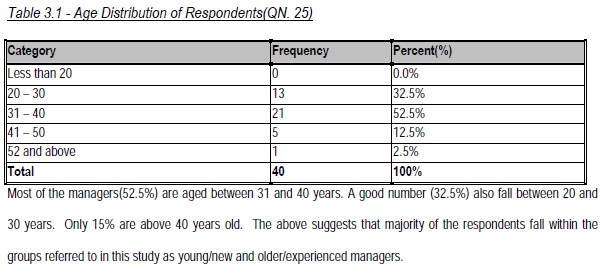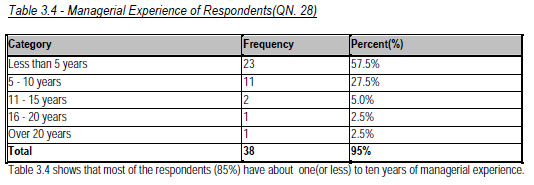There are myriads of myths and assumptions that many of us allow to guide our thoughts and actions daily. This write-up highlights an unfounded myth that prevents many employees from actualizing their full potentials in the workplace.
What Is Your Answer to This Question?
(True or False?)
An employee who has spent 20 years on the job will be more competent than one who has spent only 5 years.
The above question is one of a number in a questionnaire I administered to respondents for a 45-page management research paper I wrote in 2001.
The Center for Management Development (CMD) later invited me to deliver a lecture on that paper, to their management and staff. It’s titled “Self-Development as a Tool for Achieving Career Advancement (A Practical Guide Based on Experience)”.
Over 80% of the respondents surveyed fell between the age ranges of 20 to 40 years (Table 3.1).
About 72.5% of them held junior management/management support/middle level management positions. (Table 3.14)
Over 80% had managerial experience of 10 years or less.
And it was interesting to see that the respondents were more or less equally split in their responses (score was 2.9 on an attitudinal scale of 1 to 5, where 3 = neutral, 1 = Strongly Disagree and 5 = Strongly Agree).
The Truth Is However That Your Number of Years On The Job Matters LESS!
In other words, the realistic answer to that question is: FALSE…or Not necessarily.
Quite often it is really determined by the individual and how committed s/he is to diligently improving him/herself on the job via Self-Development.
My time in paid employment provides a good example.
Joining a fast paced multinational in later 1994, I rapidly developed myself to deliver high performance output on a consistent basis.
The company rewarded me with rapid career advancement opportunities. Within six years, I was in senior management capacity, leading others 7 to 15 years older than I was in the company.
What Did I Do Differently From Others?
Basically, I intelligently applied Self-Development techniques to give myself a competitive edge in the workplace. I got ideas from books I read, and also by applying my initiative
Among other things, I actively contributed to progress in different parts of the company – even outside my immediate areas of responsibility.
To do this effectively, I acquired skills (e.g. spreadsheet programming) that enabled me add tangible value to data handling and report preparation processes.
For instance, I developed over 4 automated spreadsheet applications that were formally adopted for management level reporting.
This got me noticed at the highest levels –even as far as the parent company in the UK, where some of my applications had to be sent for conversion from Lotus 1-2-3 macros format to Excel Visual Basic.
The above happened due to the insistence by users of my applications in the brewery when the company changed over from Lotus SmartSuite to MS Office platform.
What Do I Mean By Self-Development?
It’s never wise to assume everyone has the same view of what a concept means. I’ve used the expression “Self-Development” in this article. In my paper, I define it as follows:
“The process by which an individual continually uses her own efforts and resources (and others to which she has authorized access), to improve her ability to achieve personal and/or workplace advancement.”
Wise Words from Zig Ziglar: Don’t Have One Year’s Experience 10 Times!
In addition to what I’ve said above, I offer the following professional opinion for an accomplished developer of human capacity: Zig Ziglar (now late).
His words provide a fitting conclusion to this piece.
That is to say, you will only have 10 years of experience if you make sure EVERY year is diligently spent putting in your best efforts to improve your performance.
Final Words: Suggestion to Company Decision Makers and Recruiters
On a final note, it is my considered opinion, based on the points made above, that companies will be better off NOT asking for “X years of experience” in their adverts.
Instead, they should request for someone with “X Effective years of experience”. The criteria for determining what quantifies the required number of effective years could then be enumerated in terms of what a person vying for that position would be expected to know/be able to do, having spent those X years working elsewhere.
The above approach would enable recruiters accurately identify more suitable candidates for advertised positions, who would normally probably have been overlooked on the basis of the conventional “X years of experience” criteria.













Warning: count(): Parameter must be an array or an object that implements Countable in /home1/tayoswdg/public_html/sdnuggets/wp-includes/class-wp-comment-query.php on line 399